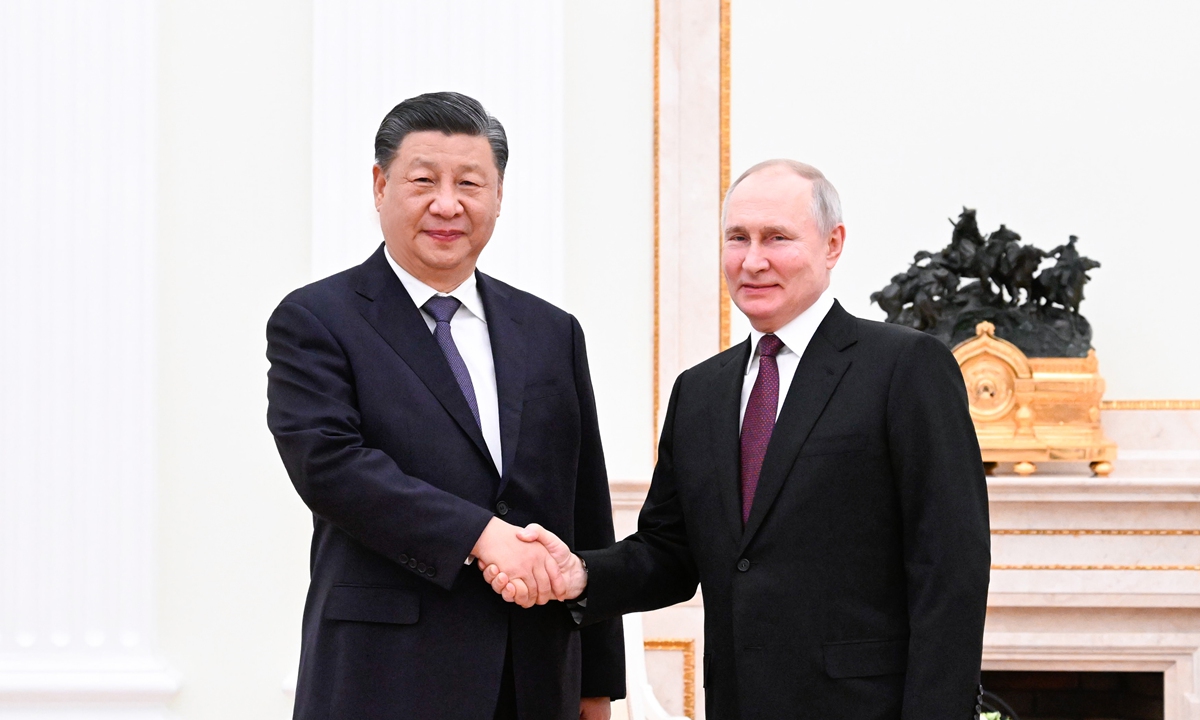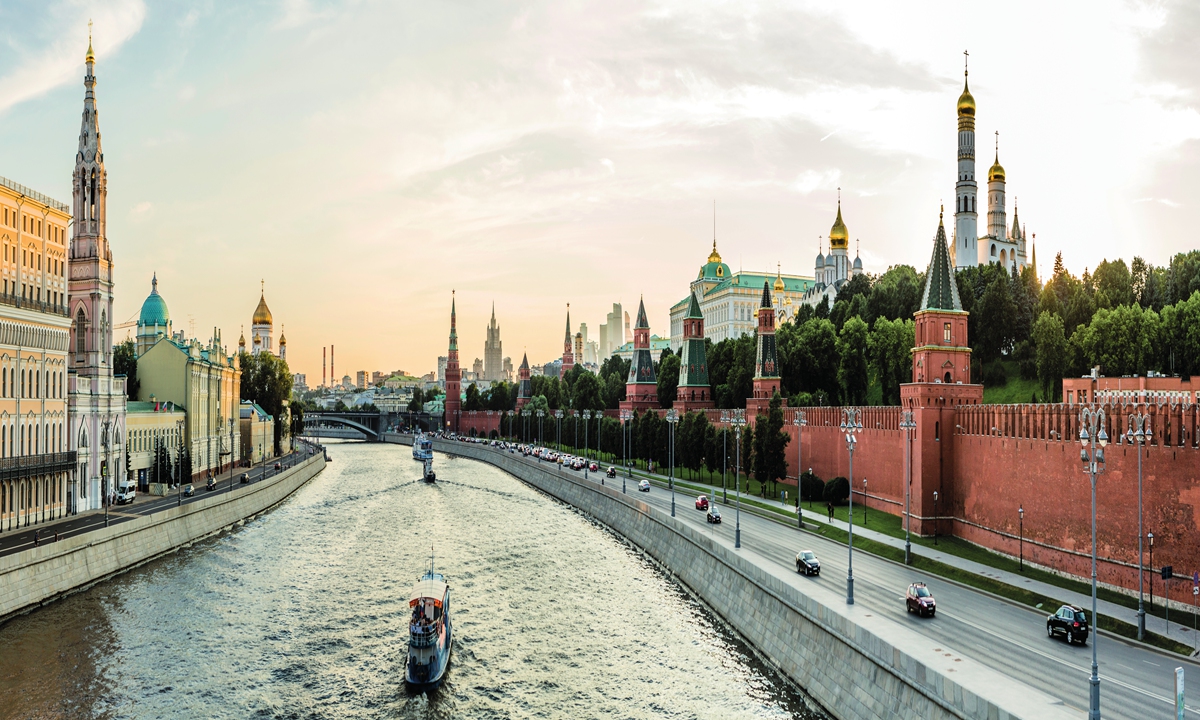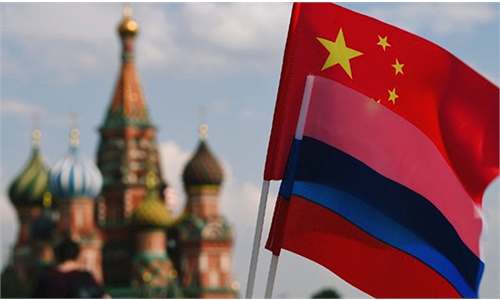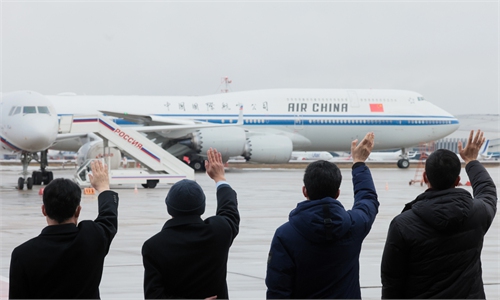Xi's trip of friendship, cooperation & peace to Russia yields fruitful results, contributes to human progress
Xi’s trip of friendship, cooperation & peace to Russia yields fruitful results, contributes to human progress

Chinese President Xi Jinping meets with Russian President Vladimir Putin at the Kremlin on his arrival in Moscow, Russia on March 20, 2023. Photo: Xinhua
Ten years ago, the question of what would be the first overseas state visit made by Chinese President Xi Jinping upon his election as president was one that attracted much attention from the international community.
Xi's trip to Moscow in March 2013 - the first by the new Chinese leader soon after taking office - indicated that China places great importance on its ties with Russia.
A decade later, Xi's three-day state visit to Russia, the first trip abroad of the Chinese leader after he was re-elected as Chinese president at this year's two sessions, was of great significance, not only to China-Russia relations but also to the world as it faces mounting challenges and bouts of geopolitical and economic turbulence.
"Russia was the first country I visited after I was elected President 10 years ago. Over the last decade, I have made eight visits to Russia. I came each time with high expectations and returned with fruitful results, opening a new chapter for China-Russia relations together with President Putin," Xi said in a signed article published by Russian media recently ahead of his state visit.
In Moscow, in the refreshing March weather that also marks the beginning of spring, Xi arrived at the Kremlin in a motorcade on March 21 on the left bank of the Moskva River. At the St. George's Hall at the Kremlin, Xi and Russian President Vladimir Putin walked toward each other from both ends of the red carpet, and in front of the national flags of the two countries, the two old friends shared a hearty handshake, which was captured by cameras as a new historic moment in China-Russia relations.
A decade ago under similar weather conditions, Xi made his first visit abroad to Moscow after being elected as Chinese president and put forward the idea of building "a community of common destiny" for the very first time in his speech at the Moscow State Institute of International Relations - a vision exerting positive and far-reaching influence on contemporary international relations.
Yury Tavrovsky, deputy chairman of the Russian-Chinese Friendship Society and head of the expert council at the Russian-Chinese Committee for Friendship, Peace, and Development, who clearly remembers Xi's trip to Moscow a decade ago, told the Global Times in Moscow that "we are impressed with this concept and with this strategy."
"We understand that there is a long way to go to realize these great concepts," Tavrovsky told the Global Times, noting that under present circumstances of global turbulence and an unpredictable future, the world needs some great ideas to follow because we don't have any other ideas for mankind, from any other country, neither from Russia nor America.
Over 10 years ago, Xi put forward some concepts, for example, the Chinese Dream. 10 years later, we see that this dream has become a reality, Tavrovsky said.

A view of the scenery along the Moskva River in Moscow, Russia Photo: VCG
Guidance of head-of-state diplomacyDuring an informal meeting between Xi and Putin on March 20, Putin said that in recent years, China has made a colossal leap forward in its development, adding "it has been the object of sincere interest around the entire world and we are even a bit envious of you," according to media reports.
The development of China-Russia relations is first led by head-of-state diplomacy. Not only do President Xi and President Putin maintain good working relations, but they also maintain a good friendship privately, which shows that political trust between the two countries has been increasing over the decade, Zhang Hong, an associate research fellow at the Institute of Russian, Eastern European, and Central Asian Studies at the Chinese Academy of Social Sciences, told the Global Times.
China-Russia relationship is not the traditional alliance. It in a way transcends this outdated form as it not only focuses on bilateral affairs but also multilateral matters, playing a positive role in enhancing regional stability and political trust, Zhang said.
Over the last decade, Xi has traveled to multiple cities in Russia. For example, in 2014, he went to Sochi to attend the opening ceremony of the Sochi 2014 Winter Olympic Games, creating a precedent for the Chinese head of state to attend a major international sporting event held outside China. In 2017, during Xi's visit to Russia, Putin awarded Xi the highest honor of Russia, the Order of St. Andrew the Apostle the First-Called, and called him "dear friend." In 2019, Xi attended the St. Petersburg International Economic Forum for the first time, and some Russian media said Xi's attendance granted a "special status" to the forum.
"Russia and China have created a new, positive pattern of international relations between major powers and neighbors," Alexander Lukin, director of the Center for East Asian and SCO Studies at the Moscow State Institute of International Relations, told the Global Times in Moscow.
They both stand for a multipolar world, but their constructive relationship shows that various poles of this world can cooperate for the benefit of the entire planet. They don't have to be engaged in geopolitical struggles for domination with other centers of power as the US, Lukin noted.
China-Russia relations go far beyond the bilateral scope and are crucial to the world and the future of mankind, Xi made the remarks when jointly meeting the press with Putin on March 21, adding that China and Russia will work together to practice true multilateralism, promote post-pandemic economic recovery, and build a multipolar world.
The high-level mutual trust and mature relations built between the Chinese and Russian leaders show that bilateral ties can withstand the impacts of the profound changes that the world is experiencing at the moment, said experts who also believe that the Ukraine crisis and worsening ties between Russia and the West cannot affect the strengthening of China-Russia ties.

Russian students stage a performance after an event during which the Chinese Embassy in Russia donated equipment to the V. Lenin's house museum in Moscow on February 10, 2023. Photo: cnsphoto
Long-lasting friendshipDuring Xi's visit to Moscow last week, the Global Times reporter talked with a number of local residents who warmly welcomed the visit and said they share many positive views on China and China-Russia relations.
"Ten years ago, there were hopes among Russian elites and Russian population that we could have good relations with the West, and Russian elites were Western-oriented. And we didn't have those hostilities. We didn't impose economic sanctions against the West," Tavrovsky said.
Maybe we'll have better relations with China, but China was not as important as it is now both politically, economically, and emotionally, the expert noted.
He believed that the emotions have changed. "Now, especially in the last year, I think that 90 percent of Russians have very warm feelings toward China, not only because of this political support, but also because we see more Chinese goods," he said.
The economic and trade cooperation between China and Russia is expected to reach a new level in 2023 and the "cornerstone" role of energy in bilateral trade has been further highlighted as Russia is now China's important source of imports in oil, natural gas, and coal. The two countries are also striving toward achieving a trade target of $200 billion set by the two heads of state within the year.
While many Western brands have been withdrawing from the Russian market, the Global Times reporter saw more Chinese brands in high demand including Chinese automobiles such as Chery, Great Wall, and Geely.
"Since 2014, Russian society has been seeing an improved recognition of China not only because China has not joined a group of sanction-imposing countries, but has also expressed a comprehensive view on issues like the Crimea crisis and now the Russia-Ukraine conflict," Zhang said.
On the Ukraine issue, voices for peace and rationality are building, Xi stressed during the meeting with Putin on March 20. Most countries support easing tensions, stand for peace talks, and are against adding fuel to the fire. A review of history shows that conflicts, in the end, have to be settled through dialogue and negotiation.
China is better positioned than many other countries to play a mediating role in the fratricidal Russia-Ukraine conflict, Andrey Kortunov, director-general of the Russian International Affairs Council, told the Global Times in Moscow.
In Moscow, they paid a lot of attention to the Chinese peace proposals that were released in February, Kortunov noted. "The question is whether the Ukrainian side might be ready to consider an immediate cease-fire and whether the West might incentivize the Ukrainian side to engage in negotiations with Moscow with no preconditions," he said.
A short but fruitful and significant visit by Xi concluded on March 22, but the visit is expected to have a far-reaching impact on regional and global affairs. The trip has also been widely described as a trip of friendship, cooperation, and peace.
In cooperating with each other, Russia and China work toward the democratization of the international system, trying to make it more just and inclusive. They defend the central coordinating role of the UN and fight off attempts to abolish the system according to international law based on the UN Charter, Lukin said.



